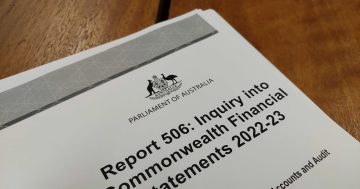
Department of Agriculture, Fisheries and Forestry secretary Andrew Metcalfe. Photo: Wiki.
The Department of Agriculture, Fisheries and Forestry is in a world of financial pain and each side of politics is blaming the other for it.
Department secretary Andrew Metcalfe has emailed all staff about the agency’s “tight financial situation”, saying expenditure is outweighing income and also suggesting that changes in government priorities have had an impact on the department.
“Over the last few financial years, the cost of delivering our essential services and policy and program responsibilities has outstripped the revenue coming into the department,” he wrote.
“And costs associated with machinery of government changes have also had an impact.”
The federal department has introduced an extensive cost-slashing regimen while asking for a budget injection to keep it functioning properly.
Contractors have been fired, all unessential travel banned, training has stopped, and some projects have been put on ice while the agency struggles to fight its way out of serious financial dire straits.
Nationals leader David Littleproud (who was the agriculture minister when the Coalition was in office) is blaming the new Government, saying the department’s finances have rapidly whittled away under Labor’s stewardship.
He has called for the matter to be referred to the Australian National Audit Office, and for the Government to give the department more money.
“Fix it and make sure the department of agriculture can do the job they’re tasked to do,” Mr Littleproud said.
He said biosecurity services were a priority and must be sufficiently funded.
But Agriculture Minister Murray Watt said the agency’s budgetary problems were the fault of the former Coalition government.
He said the Coalition got carried away with its use of contractors to the Ag department, forcing it to tighten its belt now.
“Under a series of National Party ministers, consultancy and contractor fees blew out by hundreds of millions of dollars, and they ignored report after report that called for biosecurity fees and charges to be reviewed to meet the department’s budgetary challenges,” Mr Watt said.
In 10 years, the department has drastically increased its spending on contractors, jumping from $5 million a decade ago to almost $90m in 2022.
The department says its latest cost-cutting measures have been put in place to ensure it doesn’t “spend beyond our revenue” and to reduce the impact on priorities.
With staff morale at an all-time low, measures have also been put in place to keep staff informed on changes being rolled out.
In addition to its federal budget allocation, the department raises money through cost-recovery programs – with it expecting to raise $509.3m from its own sources this financial year.
Despite its own revenue raising and the $1.16 billion from the federal budget, the department has previously flagged that it would operate this financial year at a $31.2m loss.
Labor’s determination to reduce wasteful spending in the Australian Public Service has focused on the contracting dollar. Services Australia laid off 1200 consultants over Christmas, while all agencies have been told to take a knife to their outsourcing budgets.
Consultancy contracts are being coordinated through the Department of Finance, with all requirements being closely monitored by the central agency.
As Region first reported early in January, two new panels for the Whole of Australian Government (WoAG) procurement of consultancy services have been centralised in Finance in a bid to save money and reduce the incidence of favoured or corrupt contracts.
A Finance Department spokesperson told Region: “In 2022, Finance established two new WoAG panels: the People Panel, for recruitment and search services, labour hire services and contractor services; and the Management Advisory Services Panel, for management advisory services, commonly known as consultancies.
“These panels are mandatory for non-corporate Commonwealth entities and optional for corporate Commonwealth entities and Commonwealth companies, including Government Business Enterprises authorised by Finance to use the Panel. Procurements undertaken using these panels are reported on AusTender in the usual manner.”



















